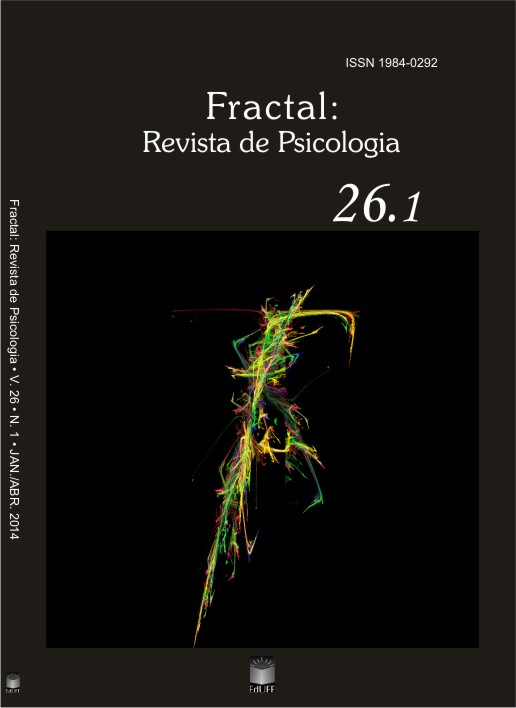Rhetoric of social influence and negotiation, according to power/recognition in society
Keywords:
social influence, action rhetoric, ethnic groupsAbstract
We studied the way pressure inflicted by more or less powerful/recognized people in society is negotiated by ethnically identified participants. We considered these phenomena drawing on social influence theories or social action rhetoric. We worked with simulated pressure situations in order to recreate possible experiences of interaction. 207 public high school students identified with Black, White and Mixed people took part in this research. The results showed rhetoric/action of rejection, acceptation and non decision to pressures. The rhetoric/action anticipated were those of cordiality, own interest, hostility and other’s interest. Whites tended to accept more the pressure of powerful people; and Blacks, to a lesser extent, to reject it. Regarding minority people, we found that all groups accepted their pressure, pointing out there is less controversy. We discussed the results within the frame of intergroup relations in the dynamics in society.Downloads
References
APFELBAUM, E. La psychologie sociale à l’épreuve des femmes: l’impensé des rapports de domination. Revue Internationale de Psychologie Sociale, [S.l.], v. 10, n. 2, p. 153-169, 1997.
BARDIN, L. L’analyse de contenu. Paris: P.U.F, 1991.
BASTIDE, R. As religiões africanas no Brasil. São Paulo: EDUSP, 1971. v. I e II.
BERKOWITZ, L. (Ed.) The Frustration aggression hypothesis revisited. In: ______. Roots of aggression. New York: Atherton, 1969. p. 1-28.
DOISE, W. (Ed.). Expériences entre groupes. Paris: Mouton, 1979.
DOLLARD, J. et al. Frustration and aggression. New Haven: Yale University Freer, 1939.
FAUSTO, B. História do Brasil. São Paulo: Edusp, 1994.
FESTINGER, L. Teoria da dissonância cognitiva (1957). Tradução de Eduardo Almeida. Rio de Janeiro: J. Zahar, 1975.
FRENCH, J. R. P.; RAVEN, B. The bases of social power. In CARTWRIGHT, D. (Ed.) Studies in Social Power. Ann Arbor: University of Michigan, 1959. p. 118-149.
GUARESCHI, N. M. F. et al. As relações raciais na construção das identidades. Psicol. Estud., Maringá, v. 7, n. 2, p. 55-64, jul./dec. 2002.
GUILLAUMIN, C. L´idéologie raciste. Paris: Mouton, 1972.
INSTITUTO BRASILEIRO DE GEOGRAFIA E ESTATÍSTICA. Pesquisa Nacional por Amostra de Domicílio. Rio de Janeiro: IBGE, 1976.
INSTITUTO BRASILEIRO DE GEOGRAFIA E ESTATÍSTICA. Censo Demográfico de 2000. Rio de Janeiro: IBGE, 2000. Disponível em: <http://www.ibge.gov.br/home/presidencia/noticias/20122002censo.shtm>. Acesso em: 16 nov. 2011.
LÉVI-STRAUSS, C. Raça e história. In: LÉVY-STRAUSS, C. (Org.). Raça e Ciência. São Paulo: Perspectiva, 1970. v. 1, p. 231-270.
LEWIN, K. Resolving social conflicts. New York: Harper & Row, 1948.
LIMA, M. E.; ALMEIDA, A. M. M. de Representações sociais construídas sobre os índios em Sergipe: ausência e invisibilização. Paidéia, [S.l.], v. 20, n. 45, p. 17-27, 2010.
MAGGI, Y. Aqueles a quem foi negada a cor do dia: as categorias cor e raça na cultura brasileira. In: MAIO; M. C.; SANTOS, R. V. (Org.). Raça, ciência e sociedade. Rio de Janeiro: Fiocruz/CCBB, 1996. p. 225-234.
MORITZ-SCHWARCZ, L. Retrato em branco e negro. São Paulo: Companhia das Letras, 1987.
MOSCOVICI, S. Psychologie des minorités actives. Paris: PUF, 1979. [Psicologia das minorias ativas. Tradução de Pedrinho Guareschi. Petrópolis, RJ: Vozes, 2011.]
MOSCOVICI, S. (Org.). Les formes élémentaires de l’altruisme. In: ______. Psychologie sociale des relations à autrui. Paris: PUF, 1994. p. 71-86.
MOSCOVICI, S.; PAICHELER, G. Social comparison and social recognition: two complementary processes of identification. In: TAJFEL, H. (Ed.). Differention between social groups. Londres: Academic, 1978. p. 251-266.
MOSCOVICI, S.; PÉREZ, J. A. A study of minorities as victims. Eur. J. Soc. Psychol, [S.l.], v. 37, n. 4, p. 725-746, 2007.
MUGNY, G.; PAPASTAMOU, S. The power of minorities. Londres: Academic, 1982.
MUNANGA, K. Rediscutindo a mestiçagem no Brasil. Petrópolis, RJ: Vozes, 1998.
OLIVEIRA, I. Desigualdades raciais: construções da infância e da juventude. Niterói: Intertexto, 1999.
PEREIRA, C.; TORRES, A. R. T.; ALMEIDA, S. T. Um estudo do preconceito na perspectiva das representações sociais: uma análise da influência de um discurso justificador de discriminação no preconceito racial. Psicologia: Reflexão e Crítica, [S.l.], v. 16, n. 1, p. 95-107, 2003.
PHILOGÈNE, G. From Black to African American: a new social representation. Westport: Praeger, 1997.
SANTOS, J. R. dos O negro como lugar. In: MAIO, M. C.; SANTOS, R.V. (Org.). Raça, ciência e sociedade. Rio de Janeiro: Fiocruz/CCBB, 1996. p. 219-223.
SEYFERTH, G. Construindo a nação: hierarquias raciais e o papel do racismo na política de imigração e colonização. In: MAIO, M. C.; SANTOS, R. V. (Org.). Raça, ciência e sociedade. Rio de Janeiro: Fiocruz/CCBB, 1996. p. 41-58.
SCHWARTZMAN, S. Raça e etnia. In: ______. As causas da pobreza. Rio de Janeiro: F.G.V, 2004. p. 101-117.
SOUZA FILHO, E. A. de. Representações antecipatórias em situações de pressão social, segundo grupo étnico-racial autodefinido, Temas em Psicologia, [S.l.], v. 19, n. 1, p. 163-177, 2011.
TAJFEL, H. Intergroup behaviour. In: TAJFEL, H.; FRASER, C. (Ed.) Introducing social psychology. Harmondsworth: Penguin, 1978. p. 401-422.
TAJFEL, H. Human groups and social categories: studies in social psychology. Cambridge: Cambridge University, 1981.
Downloads
Published
How to Cite
Issue
Section
License
Authors publishing in this journal agree to the following terms:
- Authors retain copyright and grant the journal the right of first publication, with the work simultaneously licensed under the Creative Commons Attribution License allowing sharing of the work with acknowledgement of authorship of the work and initial publication in this journal.
- Authors are permitted to enter into additional contracts separately for non-exclusive distribution of the version of the work published in this journal (e.g., publishing in an institutional repository or as a book chapter), with acknowledgment of authorship and initial publication in this journal.

This work is licensed under a Creative Commons Attribution 4.0 International License.
To the extent possible under the law, Fractal: Journal of Psychology has waived all copyright and related rights to the Reference Lists in research articles. This work is published in: Brazil.
To the extent possible under law,Fractal: Journal of Psychology has waived all copyright and related or neighboring rights to Reference lists in research articles. This work is published from: Brazil.







